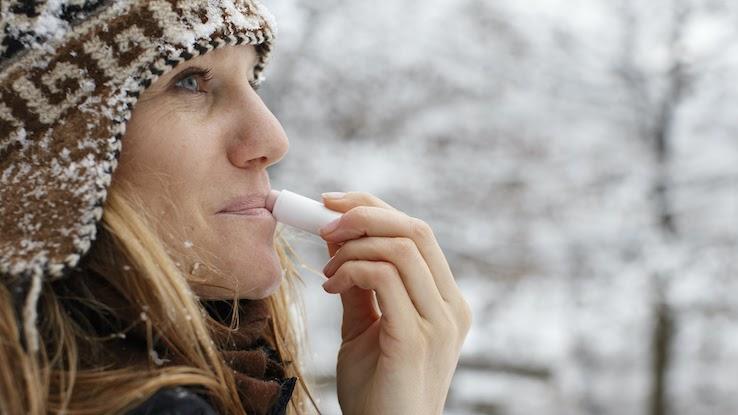
Itchy, dry, cracked, peeling — if you’ve had chapped lips before, you know how uncomfortable they can be. But what’s the reason for all this discomfort? As it turns out, anything that causes the skin cells of your lips to lose moisture can make your lips feel chapped, but some causes are more straightforward than others. Below are some of the most common causes of chapped lips (also known as cheilitis simplex), as well as several health conditions that may be related to chronic chapped lips.
Watch Out for These 10 Common Causes of Chapped Lips
1. Dehydration

Your lips don’t contain oil glands like your skin does, so they can dry out and become chapped very easily. In fact, having dry lips is one sign that you have widespread bodily dehydration. If you don’t drink enough water during the day, your lips may become dry. Certain beverages, like coffee, alcohol and caffeinated sodas, can also increase dehydration by leading to increased water loss throughout your body.
2. Licking Your Lips
When lips feel dry and chapped, it can be instinctual to lick them to feel like you’re adding moisture. However, because saliva contains digestive enzymes and it then evaporates afterward, your lips actually lose moisture and become even drier than before when you lick them. This turns into a continuing cycle of lip dehydration; before long, there’s a rough, dry, shrunken upper layer of skin separated from the moist layer below it. Biting and chewing your lips can produce the same effect.
3. Weather Conditions
Heat and sun exposure can increase your risk of developing chapped lips. The skin on your lips is vulnerable to sunburn, which damages the skin cells and can cause redness, swelling and blistering. When you’re outdoors in the sun, protecting your lips with lip balm that contains sunscreen (SPF) or petroleum jelly will help to keep them from drying out.
Cold or windy conditions can also increase the risk of chapped lips. And winter weather often means you’re more frequently exposed to heated indoor air that can have lower humidity and feel very dry. In these conditions it’s important to moisturize your lips with lip balm or petroleum jelly, too.
4. Mouth Breathing
Breathing through your mouth passes air over your lips repetitively and serves to dry them out. For this reason, nasal congestion, snoring and sleep apnea can all lead to waking with chapped lips. In each of these situations it’s best to keep your lips moisturized throughout the day, especially before going to bed. It may also be possible to work with a healthcare professional to correct the underlying problem if a condition like sleep apnea is the reason for the dehydration.
5. Toothpaste
Many toothpastes contain the ingredient sodium lauryl sulfate, which is derived from alcohol and may be irritating to your mouth or lips. Other oral beauty or hygiene products may have dehydrating alcohols in them, too. If you have chapped lips, think about whether you’re using any new products that could be causing dryness.
6. Foods
Eating acidic foods or beverages can irritate your lips or worsen chapping. Examples of foods and beverages that are highly acidic include coffee, citrus fruits and juices, tomatoes and spicy foods.
7. Allergies
Some people may have a sensitivity or allergy to certain foods or irritants that can lead to itchiness and drying of the skin on and around their lips. Oral or skin-patch testing with your doctor can help identify which ingredients may be causing a local allergic reaction in your body.
8. Vitamin Deficiency
Vitamins play an important role in maintaining your skin’s health. Inadequate intake or malabsorption of vitamins can lead to vitamin deficiency. Dry, cracked lips have been associated with deficiencies in various vitamins, including vitamins B6 and B12.
9. Medications
Certain prescription and over-the-counter medications can dehydrate skin cells, leading to the side effect of chapped lips. Common medications that have dehydrating effects include diuretics, antihistamines and retinoids.
10. Medical Conditions
Some medical disorders, including thyroid conditions, eczema, psoriasis, diabetes and systemic lupus erythematosus (SLE), impact skin dryness and may cause chapped lips. Consult a healthcare professional if your lips are chronically chapped or they’re worsening over time.
Resource Links:
https://medlineplus.gov/ency/article/002036.htm
https://www.researchgate.net/profile/Babatunde_Alli3/publication/331574561_Effect_of_Sodium_Lauryl_Sulfate_on_Recurrent_Aphthous_Stomatitis_A_Systematic_Review/links/5dd29d2a92851c382f482334/Effect-of-Sodium-Lauryl-Sulfate-on-Recurrent-Aphthous-Stomatitis-A-Systematic-Review.pdf
https://onlinelibrary.wiley.com/doi/epdf/10.1002/ncp.10321
https://www.nhs.uk/conditions/heartburn-and-acid-reflux/
https://www.ncbi.nlm.nih.gov/pmc/articles/PMC6531998/





